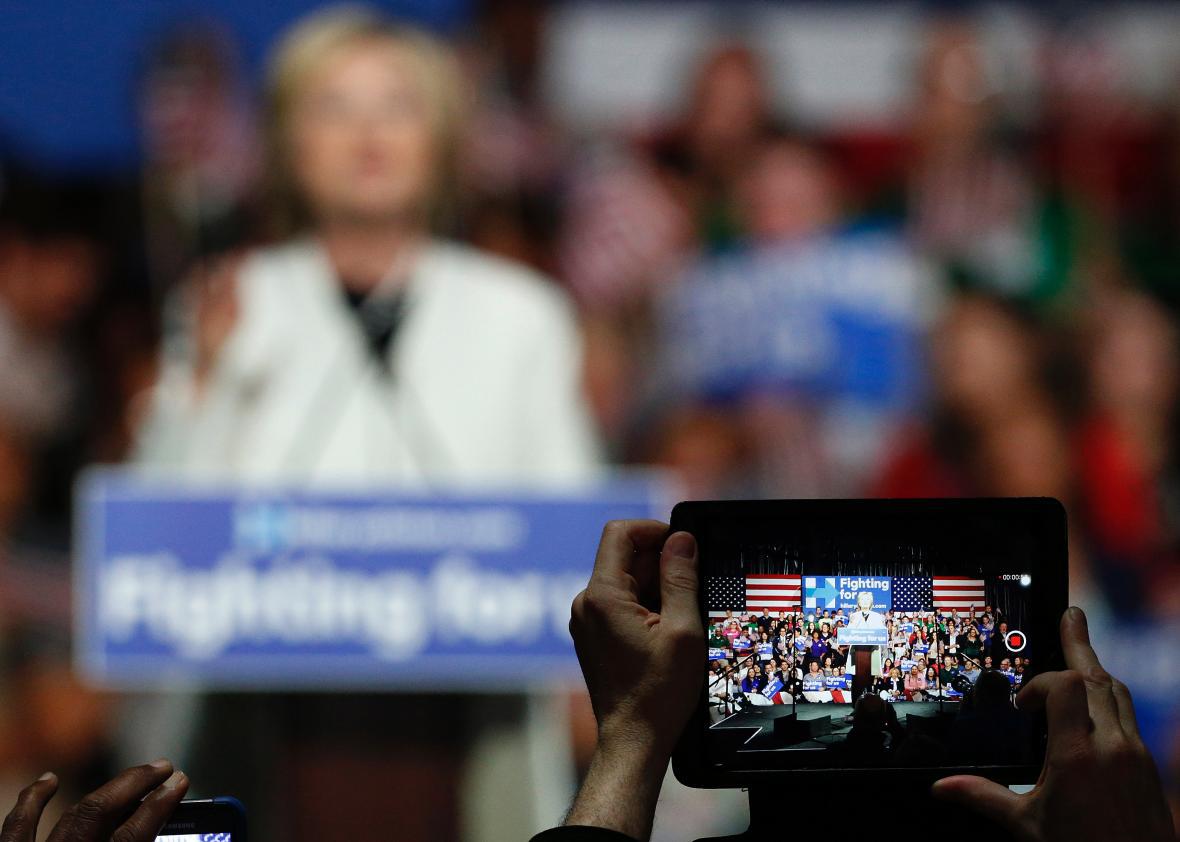With FBI Director James Comey’s tsk-tsking statement Tuesday morning, the email saga that had dogged Hillary Clinton for more than a year was over. It ended with a whimper, with an outcome that fit the facts on the ground. Back in April, Politico’s Josh Gerstein looked at dozens of federal investigations into the mishandling of classified records in an effort to glean insight into the investigation of Clinton and her use of a private email server as secretary of state. His conclusion? That we wouldn’t see an indictment.
Which is precisely what happened. Clinton was scolded but not indicted. Democrats were relieved, Republicans were outraged, and holdout supporters of Vermont Sen. Bernie Sanders were crushed. It’s obvious now that the email controversy was the perfect Hillary Clinton scandal: an event of modest consequence that reinforces every belief about her, from burning conservative hostility to deep-seated liberal anxiety.
The FBI’s judgment sounds like a victory for Secretary Clinton. It wasn’t. Yes, she escaped indictment, thus crossing one unknown from the list of unknowns that could lead to a Donald Trump victory in November. But Comey’s assessment was harsh. By his measure, Clinton and her team at the State Department were “extremely careless in their handling of very sensitive, highly classified information” and that they “should have known that an unclassified system was no place” for discussing items classified “highly sensitive” or “top secret.” What’s more, Comey said, there’s a real chance Clinton’s server was compromised by foreign agents, underscoring the degree to which her behavior was reckless.
If this were any other election, against any other Republican nominee for president, Comey’s statement would be damaging, if not deadly. It would shine a light on Clinton’s most glaring attribute: an unrelenting paranoia that leads to undue secrecy and legally permissible—if ethically dubious—decisions. In the hands of Marco Rubio or John Kasich or even Ted Cruz, it would be Exhibit A in the political case against Hillary Clinton.
But that’s a different world. Here on Earth Prime, Donald Trump is the Republican nominee for president, with an omnishambles campaign that’s too busy dealing with its own failures to capitalize on any of Clinton’s problems. Like some real-life Cobra Commander, Trump lacks the cash, personnel, or organizational skill to take advantage of Clinton’s present weakness. Instead, the story will fade from view, as she claims vindication ahead of the Democratic National Convention.
When she claims that vindication, however, Clinton will do so as a damaged candidate. There’s a decent chance that without the email scandal—and in particular, without the steady drip of negative coverage around it—she would be in even stronger shape for the general election, with higher favorability numbers than she now holds. The scandal didn’t tank Clinton’s numbers as much as it held them down, so that the inevitable decline that comes with campaigning and fighting for political power was never tempered by positive press coverage of endorsements or proposals.
For the past year, the story of Hillary Clinton in American politics has been negative: of secrecy, of scofflaw behavior, and (thanks to the Sanders campaign) of “establishment politics” and Wall Street ties. Some of this is unfair, a product of Clinton’s tense and adversarial relationship with the press and other groups in American politics. But some of it—perhaps a good deal of it—is self-inflicted.
Hillary Clinton has been the target of unfair investigations and wasteful witch hunts. Far from instilling caution, however, that scrutiny has inspired a cavalier attitude toward rules and norms and general propriety. It’s why Clinton didn’t think to follow the letter and spirit of the rules with regard to email. It’s why, after leaving the State Department, she didn’t think to avoid investment banks when she went on the circuit to speak. This just creates more trouble, which reinforces that cavalier attitude, as Clinton’s political enemies inevitably overreach.
In watching this dynamic unfold, observers bring their baggage and their prejudices. Conservatives can’t help but think this proves their beliefs about Clinton and “the Clintons,” about their inherent corruption and their disdain for rules. And despite their deep misgivings, liberals can’t help but come to their defense against those conservatives, hoping that it won’t happen again, resigning themselves to the fact that it will.
The email scandal has had something for everyone. And now it’s over. Will it be the end of the Clinton dynamic for 2016? Looking at the material that still hasn’t had a hearing in this election. Probably not.
